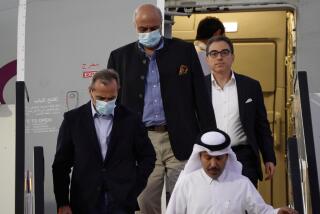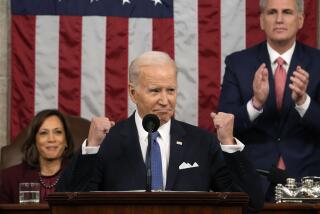U.S. plan to meet with Iran heightens debate
WASHINGTON — The Bush administration’s decision to abandon a long-held policy and meet with a top Iranian official on Tehran’s nuclear program has intensified the political debate in Washington about how best to deal with America’s adversaries.
The White House decision was hailed Wednesday by Barack Obama, the presumed Democratic presidential nominee, who has criticized Republican rival John McCain and President Bush for spurning high-level talks with Iran in the past. Obama said the United States should “stay involved with the full strength of our diplomacy.”
Sen. John F. Kerry (D-Mass.), defeated by Bush in the 2004 presidential election, said the move represented “the most welcome flip-flop in recent diplomatic history.”
Administration officials disclosed Tuesday that Undersecretary of State William J. Burns would join a delegation from five other world powers to meet with Iranian nuclear envoy Saeed Jalili in Switzerland on Saturday. U.S. officials and their allies hope Iran announces a decision on a package of political and economic incentives offered in return for abandoning its nuclear ambitions.
The move marked a distinct shift from the administration’s position that it would take part in talks with Tehran only if the Islamic regime first suspended uranium enrichment, which U.S. officials say is intended to produce a nuclear bomb but which Iran insists is for peaceful energy production.
Democrats interpreted the White House move as one that provided new support for Obama’s approach, but the McCain campaign saw it differently. In a statement, McCain foreign policy aide Randy Scheunemann suggested that Bush’s move was the kind of “multilateral diplomacy” McCain supports.
“Sen. McCain believes working with our allies presents the best chance to increase the consequences should Iran continue its defiance of the international community,” the statement said, criticizing Obama for proposing what Scheunemann called “preemptive concessions.”
Administration officials insisted that the initiative was not a substantive change, but a tactic designed to increase pressure on the Iranians to accept the offer. Burns, they say, will be present but will not negotiate.
“There’s no change in the substance, but it sends a strong signal,” said Sean McCormack, the chief State Department spokesman.
Secretary of State Condoleezza Rice believes that “it’s a smart step to take” at a time when Iranian leaders appear divided on how to deal with growing economic sanctions.
Some outside experts speculated that Iran’s goal may simply be to wait out the administration, in the hope that the next U.S. government will prove more flexible.
Ray Takeyh, an expert on Iran at the Council on Foreign Relations, said the seeming differences within the Iranian regime might be “chatter” rather than real divisions.
Iran’s supreme leader, Ayatollah Ali Khamenei, has indicated that decisions would be made by the hard-line national security committee, rather than others in Iran’s diverse power centers, Takeyh said.
Several experts and former diplomats predicted that Iran might agree at the international meeting to hold more sessions, or even offer to sign on to a proposed “freeze-for-freeze” deal under which Tehran would agree to not expand its nuclear program and the U.S. and other countries would refrain from imposing further economic sanctions.
Such a deal would allow Iran to continue refining its nuclear program but not expand it, Takeyh said.
John R. Bolton, the hard-line former U.S. ambassador to the United Nations, said the administration, in jettisoning its old policy of refusing to meet with Iran, had “succumbed to sustained pressure” from the State Department and European allies.
Bolton predicted more meetings would take place as the Iranians “buy time to get to the postelection period and make a smooth transition to the Obama administration.”
--
More to Read
Sign up for Essential California
The most important California stories and recommendations in your inbox every morning.
You may occasionally receive promotional content from the Los Angeles Times.











